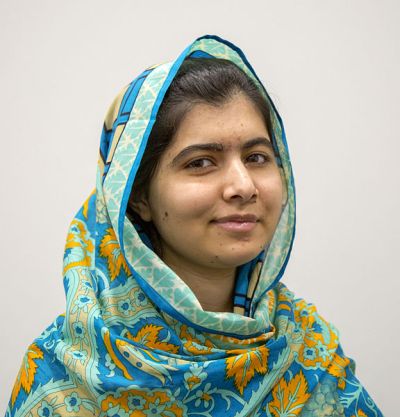|
|
|
|
|
SELANGOR, Malaysia, Oct 1, 2016 - (ACN Newswire) - After the Taliban attempted to assassinate Malala Yousafzai, Pakistani newspapers used common language to describe the attack, which suggests the media has influence in changing social perceptions of the group, according to research published in the Pertanika Journal of Social Sciences and Humanities (JSSH).
 | | Malala Yousafzai, Pakistani activist for female education and the youngest Nobel Prize laureate. (Copyright: Simon Davis/DFID) |
Malala Yousafzai is a Pakistani activist for female education and the youngest person to receive a Nobel Prize. She started writing a blog for BBC Urdu in 2009 and subsequently reported for other media about her life in the Swat valley under the Taliban, which banned girls from attending local schools. On 9 October 2012, she was attacked on a school bus by the extremist group, but survived. The incident received national and international media coverage despite Talibani threats.
In a JSSH study, Noor Hayat and Juliana Abdul Wahab of Universiti Sains Malaysia analysed four leading Pakistani English language newspapers to determine how Malala Yousafzai and the Taliban were portrayed after the attack. In their analysis, the researchers used the "media framing theory", which in this study refers to the act of selecting certain aspects of a perceived reality and making them easier to communicate to highlight an issue, definition and/or solution of a topic.
The researchers chose 29 editorials containing the word "Malala" that were published in the online editions of The News, Dawn, Daily Times and The Nation, between 10 October and 10 November 2012. These papers are considered more credible and influential to policy makers than those reporting in local languages.
The team found that the editorials generally portrayed Malala positively: 58% referred to her as an "innocent girl" who stood up for girls' education, 25.3% called her "courageous" and 17.4% used the term "activist"; in particular, The Nation and Daily Times praised Malala's bravery more than the other two papers. By comparison, the Taliban was framed negatively with the word "fanatic" appearing in 48.2% of editorials, "terrorist" in 38.5% and "anti-development" in 14.3%.
According to the researchers, their findings showed that newspapers were highlighting the Taliban's hardline actions against girls' education, in contrast to the different interpretations of its religious ideology that newspapers used to discuss in the past.
Furthermore, Pakistani people now generally regard the Taliban as a group that calls itself Muslim and imposes Shariah law (also known as the Islam law), but which in reality defies all humanity and religion, the team added.
They concluded that the Taliban's attack on Malala made it more unpopular overall, resulting in negative presentations in national newspapers and possibly a shift in how people perceive it.
For more information about this research, please contact:
Noor Hayat
School of Communications
Universiti Sains Malaysia
11800 Penang, Malaysia
Email: noorhayatsargana@gmail.com
Mobile: +6017 282 8429
About Pertanika Journal of Social Sciences & Humanities (JSSH)
Pertanika Journal of Social Sciences & Humanities (JSSH) is published by Universiti Putra Malaysia in English and is open to authors around the world regardless of nationality. It is published four times a year in March, June, September and December. Other Pertanika series include Pertanika Journal of Tropical Agricultural Science (JTAS), and Pertanika Journal of Science & Technology (JST).
JSSH aims to develop as a pioneer journal for the social sciences with a focus on emerging issues pertaining to the social and behavioural sciences as well as the humanities. Areas relevant to the scope of the journal include Social Sciences - Accounting, anthropology, Archaeology and history, Architecture and habitat, Consumer and family economics, Economics, Education, Finance, Geography, Law, Management studies, Media and communication studies, Political sciences and public policy, Population studies, Psychology, Sociology, Technology management, Tourism; Humanities - Arts and culture, Dance, Historical and civilisation studies, Language and Linguistics, Literature, Music, Philosophy, Religious studies, Sports.
The journal publishes original academic articles dealing with research on issues of worldwide relevance. The journals cater for scientists, professors, researchers, post-docs, scholars and students who wish to promote and communicate advances in the fields of Social Sciences & Humanities research.
Website: http://www.pertanika.upm.edu.my/
The paper is available from the following links: http://bit.ly/2dxctqX
For more information about the journal, contact:
The Chief Executive Editor (UPM Journals)
Head, Journal Division, UPM Press
Office of the Deputy Vice Chancellor (R&I)
IDEA Tower 2, UPM-MDTC Technology Centre
Universiti Putra Malaysia
43400 Serdang, Selangor
Malaysia.
Phone: +603 8947 1622 | +6016 217 4050
Email: nayan@upm.my
Press release distributed by ResearchSEA for Pertanika Journal.
Topic: Press release summary
Source: Pertanika Journal
Sectors: Science & Research
https://www.acnnewswire.com
From the Asia Corporate News Network
Copyright © 2024 ACN Newswire. All rights reserved. A division of Asia Corporate News Network.
|
|
|
|

|
|
|
|